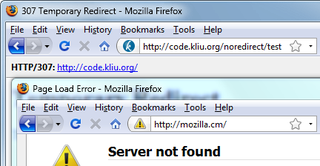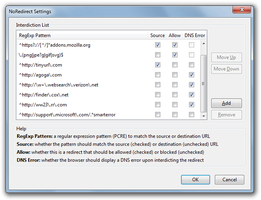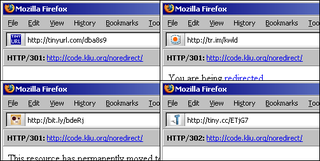立即下載 Mozilla Firefox,體驗快速、自由地在網路中穿梭,並且享受成千上萬的擴充套件!
關閉關於此附加元件
===== ===== ===== =====
Examples of Usage
===== ===== ===== =====
* Stopping DNS error redirects
-- -- -- -- -- -- -- --
The original impetus for NoRedirect came from my frustration over Verizon's search service, for which opting out was not always possible. Every time I hit a DNS error—by mistyping an address, clicking on a link with a typo, leaving off a letter when copying and pasting, etc.—I would be redirected to Verizon's "helpful" search page, which meant that, if I wanted to fix my typo, I had to retype the entire address.
Such user-hostile services are now employed by virtually all major ISPs and even some domain registries—many users have experienced the frustration of being redirected after typing ".com" as ".cm". In addition to suppressing such redirects, NoRedirect will also restore the browser's native behavior: the browser will display its built-in DNS error message, and the browser's keyword search feature, if enabled, will be protected from interference caused by these DNS hijacks.
* Previewing/screening "shortened" URLs
-- -- -- -- -- -- -- --
Among the problems of URL shortening services is not being able to tell where a URL leads until it is too late. While some services offer "previews" if you set a cookie, not all services offer this feature. By blocking redirects originating from known URL shortening services, NoRedirect can be configured to act as a gatekeeper to make sure that all redirection service URLs are screened.
* Stopping "smart" error pages
-- -- -- -- -- -- -- --
There are some sites that, instead of displaying a standard error page, will redirect you to the site's main page or to a "smart" error page. More often than not, these measures, instead of being helpful, just end up disrupting the user's browsing experience, making it difficult to fix simple errors such as typos or the leaving off of a few characters when copying and pasting an address. NoRedirect can be configured to stop such nuisances.
===== ===== ===== =====
Configuration
===== ===== ===== =====
NoRedirect operates using a customizable list of rules. You can block redirects based on their source (useful for screening redirection services) or destination (useful for stopping DNS error hijacks). The flexibility of the rule system makes it possible to exercise both coarse and fine-grained control. For example, you could treat the rule list as a simple blacklist, or you could treat the rule list as a simple whitelist by placing various allow rules above a wildcard block rule, or you could cook up you own scheme, such as creating a set of rules to block all redirects except for those that end in an image file extension or those that originate from example.org
Examples of Usage
===== ===== ===== =====
* Stopping DNS error redirects
-- -- -- -- -- -- -- --
The original impetus for NoRedirect came from my frustration over Verizon's search service, for which opting out was not always possible. Every time I hit a DNS error—by mistyping an address, clicking on a link with a typo, leaving off a letter when copying and pasting, etc.—I would be redirected to Verizon's "helpful" search page, which meant that, if I wanted to fix my typo, I had to retype the entire address.
Such user-hostile services are now employed by virtually all major ISPs and even some domain registries—many users have experienced the frustration of being redirected after typing ".com" as ".cm". In addition to suppressing such redirects, NoRedirect will also restore the browser's native behavior: the browser will display its built-in DNS error message, and the browser's keyword search feature, if enabled, will be protected from interference caused by these DNS hijacks.
* Previewing/screening "shortened" URLs
-- -- -- -- -- -- -- --
Among the problems of URL shortening services is not being able to tell where a URL leads until it is too late. While some services offer "previews" if you set a cookie, not all services offer this feature. By blocking redirects originating from known URL shortening services, NoRedirect can be configured to act as a gatekeeper to make sure that all redirection service URLs are screened.
* Stopping "smart" error pages
-- -- -- -- -- -- -- --
There are some sites that, instead of displaying a standard error page, will redirect you to the site's main page or to a "smart" error page. More often than not, these measures, instead of being helpful, just end up disrupting the user's browsing experience, making it difficult to fix simple errors such as typos or the leaving off of a few characters when copying and pasting an address. NoRedirect can be configured to stop such nuisances.
===== ===== ===== =====
Configuration
===== ===== ===== =====
NoRedirect operates using a customizable list of rules. You can block redirects based on their source (useful for screening redirection services) or destination (useful for stopping DNS error hijacks). The flexibility of the rule system makes it possible to exercise both coarse and fine-grained control. For example, you could treat the rule list as a simple blacklist, or you could treat the rule list as a simple whitelist by placing various allow rules above a wildcard block rule, or you could cook up you own scheme, such as creating a set of rules to block all redirects except for those that end in an image file extension or those that originate from example.org
![[警告]](https://addons.thunderbird.net/static/img/developers/test-warning.png?b=58a99cbb-667a0970) 權限
權限





